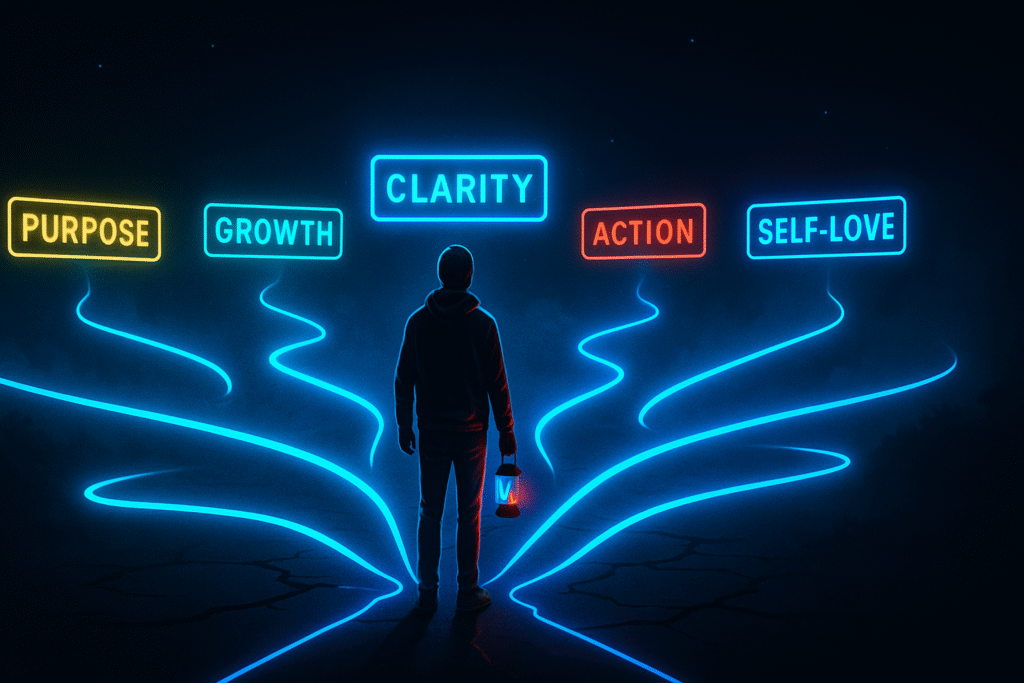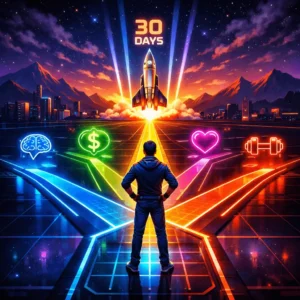You wake up. Scroll. Work. Scroll again. And somewhere between all that, a quiet voice asks, “What am I even doing with my life?”
You’re not depressed—but not exactly happy either. You might be thinking, “I feel lost in life” or “I don’t know what to do with my life anymore.” Maybe you’re experiencing that heavy feeling where “I don’t feel so good” but can’t pinpoint exactly why.
This isn’t just mental fog—it’s emotional turmoil caused by disconnection from your inner compass, your sense of purpose, and your personal values.
The good news? Feeling lost is a sign that something inside you is ready to shift. When acknowledged properly, it becomes a starting point for self-discovery, reinvention, and personal growth.
What You’ll Learn from This Guide
- Why you’re feeling lost in life, based on emotional and psychological triggers
- How to practice emotional acknowledgment and self-compassion
- How to clarify your values and build a meaningful direction
Why Do I Feel So Lost in Life?
Here are five reasons you feel lost and how to find yourself again
1. You’re Disconnected from What Matters
You’ve been reacting to parental stress, work, or societal scripts, leaving your life on autopilot. This disconnection from your value-based activities leads to a fractured sense of self and creates incongruency between who you are and how you’re living.
Read More: What do I want to do with my Life
2. You’re Living Someone Else’s Life Script
If you’re following a career path or lifestyle that doesn’t reflect your qualities or personal motivations, you’ll eventually feel like you’re just performing, not living. This lack of behavior alignment with your authentic self creates a persistent sense of emptiness.
3. You’ve Outgrown an Old Identity
After a breakup of a relationship, a major life change, or the death of a loved one, your former self may no longer feel relevant. These traumatic experiences test your self-image and push you to reinvent yourself. Life changes force you to confront mortality and question your sense of self.
Read More: How to Reinvent Yourself
4. You’re Suppressing Emotions
Ignoring difficult feelings like shame or burnout can lead to mental fog. Without mindfulness, self-care, or an objective viewpoint, these unresolved emotions block clarity. Your coping mechanisms may be admitting it’s broken but not addressing the underlying issues.
5. You’re Frozen by Uncertainty
Trying to control every outcome only intensifies the pressure. But clarity doesn’t come from standing still—it comes from imperfect action, critical thinking, and the courage to course-correct. This paralysis often stems from the illusion that you need perfect certainty before moving forward.
What to Do When You’re Feeling Lost in Life
These five steps combine self-reflection, values clarification, and momentum-building action to help you find your way back to yourself.
Step 1: Acknowledge Your Feelings Without Judgment
Say it: “I feel lost in life—and that’s okay.” That’s not weakness—it’s a sign of self-awareness and strength. This honest self-reflection requires sincerity and the courage to face small truths about your current state.
Try This: Do a 5-minute brain dump to explore your emotional turmoil. Write down fears, regrets, and doubts. No filter. This builds self-compassion and makes room for clarity. The mental payoff of this genuine thinking exercise helps you develop an objective viewpoint on your situation.
Read More: How to Stop Judging Yourself
Step 2: Reconnect with Your Personal Values
Most people don’t lack direction—they lack alignment. Values clarification puts your choices back in sync with your meaningful direction and connects you to your sources of meaning.
Try This: Use the funeral exercise or retirement party exercise to gain perspective on your parenting values and life priorities.
Ask:
- “What value areas do I want to live by?”
- “What would people say about my life at my funeral?”
- “What personality traits do I want to be remembered for?”
These exercises anchor your behavior in value-based activities and offer long-term motivation while helping you identify which life domains need attention.
Step 3: Accept the Discomfort of Not Knowing
Trying to have all the answers is an illusion. Growth often starts with imperfect action and giving yourself permission to be unsure. Understanding the upsides and downsides of different choices helps you make peace with uncertainty.
Try This: Ask, “What’s the upside of starting without clarity?” Let go of needing to predict all consequences and outcomes. Trade that pressure for small, real progress. Find comfort in the fact that you’re at a crossroads where multiple paths could lead to growth.
Read more: Why Do I Feel Like a Failure: Overcoming Self-Doubt
Step 4: Redefine Progress with Small, Intentional Wins
Instead of waiting for momentum, create it through small goals that align with your values and support behavior change.
Try This:
- Journal one sentence a day to support self-discovery
- Read 2 pages of a book that offers research-based strategies
- Reach out to a community or volunteer to help someone else
- Practice progressive muscle relaxation for 5 minutes daily
Read More: How to Use The Compound Effect to Create Unstoppable Momentum
Step 5: Seek Inspiration and Guidance
Feeling lost doesn’t mean you’re broken—it means you’re ready for new input. Don’t isolate yourself when seeking support could provide the guidance you need.
Try This:
- Read books by your heroes or explore stories of resilience
- Join a life coaching program or a get enrolled in youth mentorship program
- Have a brainstorming session with someone you trust to unlock new ideas
- Learn from role models and reverse engineer their success
Learning from others gives you motivational energy and fuels long-term self-improvement. These shared experiences remind you that feeling lost is part of the human experience and that professional help is available when needed.
How to Stick With These Changes
Once you’re in motion, this 3-step method helps you build consistency and avoid burnout while you master a skill or pursue your passion and purpose.
Make It Obvious
The average person checks their phone over 90 times a day. Create visible reminders of your growth.
Examples:
- A lock screen with your life domains or focus words
- A habit tracker app on your home screen
- A pinned digital note with your sources of meaning
When your priorities are visible, they become easier to follow and support better decision-making.
Make It Easy
Simplify your actions to avoid overthinking and reduce the pressure to be perfect.
Examples:
- Want to start reading? Just read one paragraph
- Want to develop your strengths? Watch one 5-minute video daily
- Want to master a skill? Try a 2-minute version today
Progressive muscle relaxation, deep breathing, or a quick win builds confidence and creates positive momentum.
Make It Rewarding
Your brain needs a reason to come back, and celebrating small wins reinforces your sense of direction.
Examples:
- Celebrate each micro-win with a bite of chocolate
- Light a scented candle after completing a journal entry
- Reward consistency with a weekend treat—like a favorite snack, a walk, or a chill playlist
This material reward system builds a habit loop that supports long-term change and helps you maintain self-love throughout the process.
What If Feeling Lost Is Just the First Step Toward a Life That Actually Fits You?
That quiet sense of “I don’t know what I’m doing with my life” isn’t a dead end—it’s a signal. And everything you just read? It’s not just advice—it’s the foundation of a personalized, gamified system that helps you build clarity, confidence, and momentum without relying on willpower.
The Moore Momentum Habit Tracker App turns emotional fog into daily traction by helping you:
- Replace mental overwhelm with small, value-aligned wins
- Reconnect with who you are through consistent self-awareness practices
- Track your emotional and behavioral progress—without burnout or guesswork
- Feel better, faster by stacking tiny habits that rebuild purpose and identity
When you’re feeling stuck, it’s not about fixing everything—it’s about moving one piece at a time in the right direction.
Conclusion – Reasons You Feel Lost in Life
If you’re saying “I feel lost in life”, you’re not failing—you’re shifting. This discomfort is your signal to pause, ask honest questions through asking questions, and take imperfect but aligned action. Whether it’s reconnecting with your values, seeking guidance, or journaling your thoughts—every action counts.
You don’t need a perfect plan. You need momentum. And once you have that, everything else becomes figure-out-able.
Frequently Asked Questions
What happens when a person loses a sense of feeling?
Your internal alarm system shuts down. You can’t tell if you’re in danger or safe, happy or sad. Life loses its color.
I am feeling lost, unhappy, exhausted, and unsatisfied. What can be done for my mental health?
Start small. I have felt lost, unhappy, exhausted, and unsatisfied at various points in my life. Pick one tiny thing that used to make you smile and do it today. Tomorrow, do it again or try something new.
Why do I feel so alone and lost in life due to societal pressure?
You’ve drifted away from your anchor points – the people, passions, and purpose that give life meaning. It’s time to reconnect.
What to do when feeling lost in life?
Find meaning through small goals. Connect with people who understand. Reflect on your values. Seek professional help if needed. Take one day at a time. Embrace uncertainty as part of growth. Practice self-compassion and patience.
How to Find Yourself Again and How to Stop Feeling Lost in Life?
Reflect on your values, set clear goals, seek support, try new activities, practice mindfulness, and limit social media.
How Do You Describe Feeling Lost in Life?
Feeling lost is a state of confusion and uncertainty about your purpose, direction, or identity.
Why Do I Feel Lost Again?
Life transitions, unresolved issues, burnout, lack of purpose, and external pressures can cause recurring feelings of being lost.
Why Do I Feel So Lost In Life Even If Things Look Okay On Paper?
It’s often because your life domains or personal values are out of sync. Without alignment, even success feels empty. This incongruency between external achievements and internal fulfillment creates a persistent sense of disconnection from your true self.
What To Do When You Feel Lost In Life But Don’t Feel Depressed?
Practice emotional acknowledgment, clarify your behavior alignment, and start with small goals like journaling or coaching sessions. Focus on self-care activities and mindfulness practices that help you reconnect with your inner compass.
Is It Normal To Feel Like “I Don’t Feel So Good” And Not Know Why?
Yes. That’s often unresolved emotional energy or suppressed feelings that need attention. Try mindfulness exercises, brain dumping, or talking to a trusted friend to unpack it. Sometimes our coping mechanisms aren’t addressing the root cause of our discomfort.
Why Am I Struggling With Decision Making Even After Reading So Much Advice?
Overanalyzing leads to mental fatigue and decision paralysis. Try a brainstorming session with a friend or coach to simplify options and course-correct. Sometimes the key is accepting that imperfect action is better than perfect inaction.
How Do I Know If I Need Professional Help For Feeling Lost?
If your feelings persist despite self-help efforts, or if they’re accompanied by symptoms of depression, anxiety, or interfere with daily functioning, consider seeking professional help. A therapist can provide personalized guidance and research-based strategies for your specific situation.
Can Feeling Lost Actually Be A Good Thing?
Absolutely. Feeling lost often signals that you’re outgrowing your current situation and ready for personal growth. It’s your inner wisdom telling you that it’s time to realign with your authentic self and pursue a more meaningful direction.
How Long Does It Typically Take To Feel Less Lost?
The timeline varies for everyone, but most people start feeling more grounded within a few weeks of consistent self-care and values-aligned action. The key is maintaining momentum with small, daily steps rather than expecting overnight transformation. know if I need professional help for feeling lost? If your feelings persist despite self-help efforts, or if they’re accompanied by symptoms of depression, anxiety, or interfere with daily functioning, consider seeking professional help. A therapist can provide personalized guidance and research-based strategies for your specific situation.






